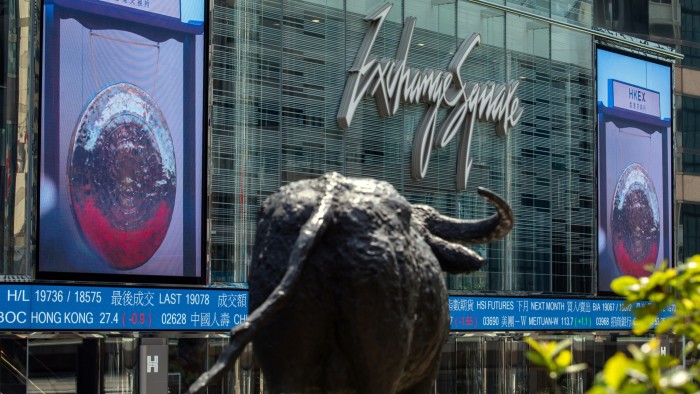Large Hong Kong-listed ETFs show resilience in 2022

Simply sign up to the Exchange traded funds myFT Digest -- delivered directly to your inbox.
Latest news on ETFs
Visit our ETF Hub to find out more and to explore our in-depth data and comparison tools
Amid a rout in the Hong Kong and mainland China stock markets last year, investors kept faith in many large Hong Kong-listed exchange traded funds committing about $10bn in net inflows even as losses mounted.
Hong Kong’s flagship Hang Seng index dropped 15.5 per cent and the CSI 300 Index, which tracks the biggest China A-share stocks, fell 21.6 per cent last year — their worst performance in 11 and four years respectively — as investors suffered a challenging year.
But the asset size of Hong Kong’s ETF market fell by much less than these two major indices, by only 10.5 per cent, to HK$384bn ($48.9bn) at end-December 2022, down from HK$428.67bn 12 months earlier, according to Hong Kong Exchanges & Clearing data.
The average daily turnover for Hong Kong-listed ETFs was much higher in 2022, hitting HK$9.8bn, 48 per cent higher than the HK$6.6bn recorded for 2021.

This article was previously published by Ignites Asia, a title owned by the FT Group.
The Tracker Fund of Hong Kong ETF accounted for over half of the total net inflows at $5.3bn.
The Hang Seng China Enterprises ETF and CSOP Hang Seng TECH ETF also managed to pull in substantial investments despite the sectors’ poor performance in 2021, recording net inflows of $2.04bn and $1.38bn respectively.
However, many smaller greater China and technology ETFs listed in Hong Kong suffered a terrible year, as jittery investors fled these markets and under-pressure sectors.
Of the 145 ETFs listed on the HKEX, 37 invest in China’s A-share market. Assets in these products dropped more than 30 per cent, from HK$77.6bn at the start of 2021 to HK$53.2bn 12 months later.
Six out of 10 ETFs with the largest decrease in fund assets last year focused or mainly focused on Chinese stocks, while the remaining four invested in the tech sector, according to Morningstar data.
Chris Piggott, head of Hong Kong ETF Services at Brown Brothers Harriman, said there had been obvious downward pressure on the market capitalisation for ETFs in Hong Kong and many investors chose to “step to the sidelines” at certain times to “re-evaluate their overall risk appetite”.
Katie He, Hong Kong-based head of product and strategy at ChinaAMC (HK) said that the dramatic drop in some of the firm’s China focused ETFs was caused by a small number of institutional investors in the region redeeming and deciding to reallocate their money elsewhere in Asia.
“In 2022, the market had a lot of concerns on whether China was still investable,” said He.
“Covid-related policies and regulations regarding the tech and real estate sector had a great impact on market confidence,” she added.
China’s tech-focused businesses were heavily impacted by an amendment to the anti-monopoly law in 2022, while China’s strict pandemic control policies had a negative effect on the broader economy.
However, analysts are already seeing a reversal of 2022’s sentiment.
“We have started to see investors putting a little bit more risk back into their portfolios,” said Pigott. “There will be some renewed momentum coming back into some of the China products.”
ChinaAMC (HK)’s He said ChinaAMC CSI 300 Index ETF had seen encouraging inflows since the announcement of the end of China’s zero Covid policy and was confident that investors would return quickly to the market.
“China is unquestionable in allocation,” she said. “Given the promising reopening and supportive policies towards the economy, investors will come back to the China market.”
“The key is how much to do and when to come back to the China market,” she added.
*Ignites Asia is a news service published by FT Specialist for professionals working in the asset management industry. Trials and subscriptions are available at ignitesasia.com.

Click here to visit the ETF Hub

Comments